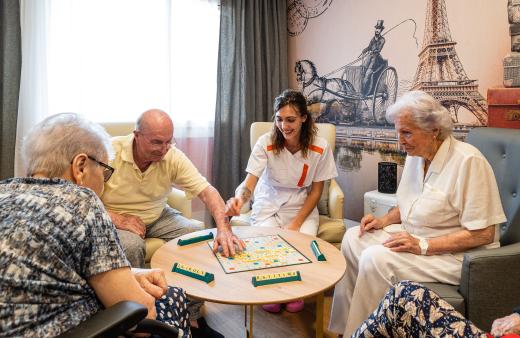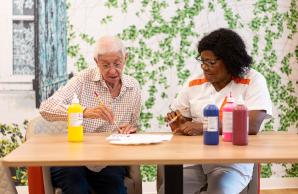Alzheimer’s disease: our European actions to help our elderly

Across Europe, the Clariane Group’s Korian care homes are innovating to provide a warm and caring environment for our residents and their families. Special, tailored information resources are produced to improve understanding of the disease and raise awareness among those affected, their families, younger generations and anyone else interested in the subject.
In France and Germany, family days to talk about the disease are held in our facilities. In addition, Korian in France will be offering free memory tests throughout the country from 16 September to 13 October 2024. This initiative is designed to raise public awareness of the importance of early detection of the disease. The earlier the disease is detected, the more we can put in place measures to slow its progress and prepare family members. The Korian teams in Germany are also invited to participate in the ‘#Bademantelchallenge’ and wear a bathrobe in public. The objective is to raise public awareness about Alzheimer’s disease and show solidarity with those affected by the illness!
In Italy, events are organised in collaboration with residents’ and patients’ associations to support families. A website dedicated to the disease, “Alzheimer in Lab”, is also on hand. Caregivers use the “Naomi Feil” validation method in their discussions with residents and have set up discussion groups for employees working in protected units. The Alzheimer’s units have a village-like environment recreated: the floor reproduces the cobblestones of a town, and the corridors recreate places familiar to the residents such as florists, bus stops and greengrocers. Numerous activities have also been carried out to raise awareness among secondary school pupils.
In Belgium, all our employees, including those at our head offices, are trained to provide residents with better support using the person-centred approach to care: Positive Care. The nursing and care homes organise local actions and readings for residents and their families. Alzheimer’s cafés have been set up to support families.
In the Netherlands, a number of good practices have been put in place, such as the carers’ cafés and activities shared between residents and their families. A culture of ethical questioning has widely been developed. Our facilities are small, offering a very family-like environment that encourages residents to be independent. The “home-like” layout provides markers that enable each space to have a clearly identifiable use, thanks to accessories, decoration and furniture that matches the uses of the space.
In Spain, a family school has been set up to help relatives better understand the disease, support their loved ones and become fully involved into the life of the facility. This initiative aims to strengthen support for families and improve residents’ quality of life by facilitating their integration into a caring, family environment.


